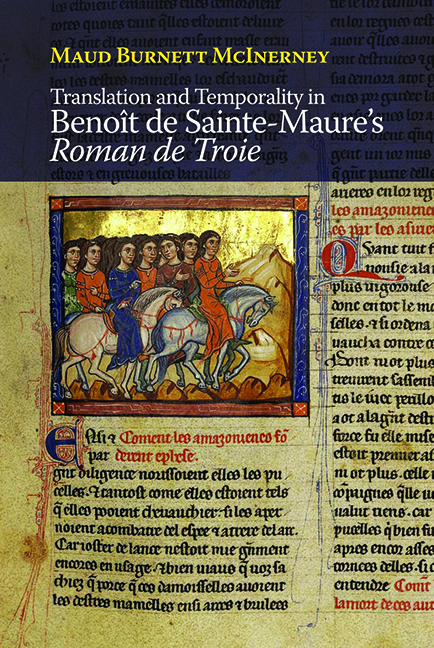Book contents
- Frontmatter
- Dedication
- Contents
- Acknowledgements
- List of Abbreviations
- Introduction: Trojan Time Machines
- 1 A Cupboard in Athens: Translating Troy
- 2 A Very Old Book, or How to Predict the Past
- 3 Ladies’ Time
- 4 Queer Time for Heroes
- 5 Hector in the Alabaster Chamber: Ekphrasis and its Discontents
- Conclusion: Trojan Futurities
- Appendix: The Manuscript Tradition of the Roman de Troie
- Bibliography
- Index
- Gallica
Conclusion: Trojan Futurities
Published online by Cambridge University Press: 07 October 2022
- Frontmatter
- Dedication
- Contents
- Acknowledgements
- List of Abbreviations
- Introduction: Trojan Time Machines
- 1 A Cupboard in Athens: Translating Troy
- 2 A Very Old Book, or How to Predict the Past
- 3 Ladies’ Time
- 4 Queer Time for Heroes
- 5 Hector in the Alabaster Chamber: Ekphrasis and its Discontents
- Conclusion: Trojan Futurities
- Appendix: The Manuscript Tradition of the Roman de Troie
- Bibliography
- Index
- Gallica
Summary
Sing, O Muse, of the rage of Achilles, of Peleus’ son, murderous, man-killer, fated to die, sing of the rage that cost the Achaeans so many good men and sent so many vital, hearty souls down to the dreary House of Death. And while you’re at it, O Muse, sing of the rage of the gods themselves, so petulant and so powerful here on their new Olympos, and of the rage of the post-humans, dead and gone though they might be, and of the rage of those few true humans left, self-absorbed and useless though they may have become. While you are singing, O Muse, sing also of the rage of those thoughtful, sentient, serious but not-so-close-to-human beings out there dreaming under the ice of Europa, dying in the sulfur-ash of io, and being born in the cold folds of Ganymede.
When Dan Simmons's 2003 novel Ilium begins, the Trojan War is in its ninth year, just as it is at the beginning of Homer's Iliad. The events that unfold upon the field of battle some time around 1200 BCE, however, are manipulated by gods, actually technologically enhanced post-humans, who live on Olympus Mons on Mars, and broadcast the war to the dwindling and degenerate surviving population of “old-style” humans who still inhabit the earth sometime in the late fourth millenium CE. The novel plays not with the well-established science fiction trope of the time paradox, as one might expect, but rather with the idea of narrative temporality itself. The text of the Iliad, often quoted, operates like destiny: the readers outside the text know how it ends, and so do some of the readers inside the texts, the “scholics” kidnapped from early twenty-first century Classics departments to report on the degree to which a given day's events do or do not map onto Homer's account. And when events begin to diverge from that account, when Achilles and Hector join forces to make war upon the meddling gods, all kinds of possibilities seem to open out: what if Hector didn't die? What if the city never fell? What if narrative time and destiny were not one and the same?
- Type
- Chapter
- Information
- Publisher: Boydell & BrewerPrint publication year: 2021



